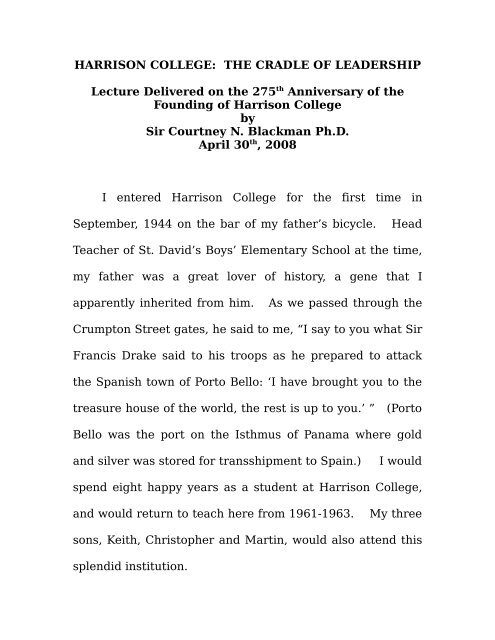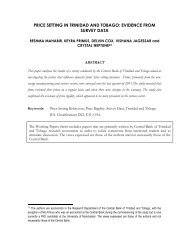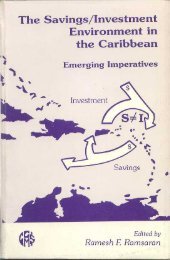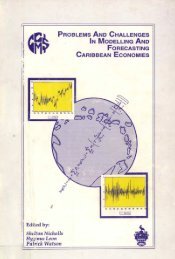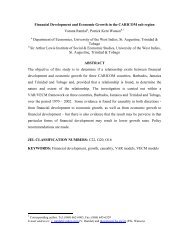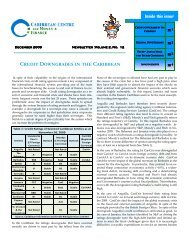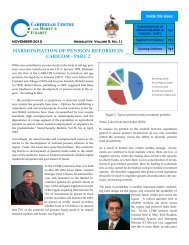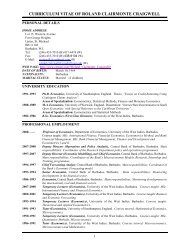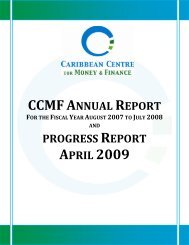HARRISON COLLEGE: THE CRADLE OF LEADERSHIP
HARRISON COLLEGE: THE CRADLE OF LEADERSHIP
HARRISON COLLEGE: THE CRADLE OF LEADERSHIP
You also want an ePaper? Increase the reach of your titles
YUMPU automatically turns print PDFs into web optimized ePapers that Google loves.
<strong>HARRISON</strong> <strong>COLLEGE</strong>: <strong>THE</strong> <strong>CRADLE</strong> <strong>OF</strong> <strong>LEADERSHIP</strong><br />
Lecture Delivered on the 275 th Anniversary of the<br />
Founding of Harrison College<br />
by<br />
Sir Courtney N. Blackman Ph.D.<br />
April 30 th , 2008<br />
I entered Harrison College for the first time in<br />
September, 1944 on the bar of my father’s bicycle. Head<br />
Teacher of St. David’s Boys’ Elementary School at the time,<br />
my father was a great lover of history, a gene that I<br />
apparently inherited from him. As we passed through the<br />
Crumpton Street gates, he said to me, “I say to you what Sir<br />
Francis Drake said to his troops as he prepared to attack<br />
the Spanish town of Porto Bello: ‘I have brought you to the<br />
treasure house of the world, the rest is up to you.’ ” (Porto<br />
Bello was the port on the Isthmus of Panama where gold<br />
and silver was stored for transshipment to Spain.) I would<br />
spend eight happy years as a student at Harrison College,<br />
and would return to teach here from 1961-1963. My three<br />
sons, Keith, Christopher and Martin, would also attend this<br />
splendid institution.
I recall the school as being extraordinarily well-<br />
administered and a place where discipline was effortlessly<br />
maintained and civility was the norm, especially at the<br />
senior levels. The adage, “Manners cost nothing but are<br />
worth a lot,” was repeated ad nauseam by my first<br />
Headmaster, Mr. Haskell. The masters who taught me the<br />
Classics – Latin, Greek, Ancient History and Literature -<br />
were mostly Englishmen or white Barbadians who had<br />
attended Oxford or Cambridge University. They were<br />
erudite, passionately devoted to their specific subject and to<br />
the pursuit of learning for its own sake. Above all, they<br />
insisted on gentlemanly deportment. The measure of their<br />
own performance was the examination results of their<br />
students, about whose colour they seemed to care nothing.<br />
Harrison College was, as I look back, an oasis in the desert<br />
of racial discrimination that characterized Barbados in that<br />
era. It was a meritocracy par excellence, in which<br />
accomplishment in academics or sport determined one’s<br />
status.<br />
2
Cricket was, and remains, my passion, though<br />
somewhat diminished by the recent decline of West Indian<br />
cricket. Indeed, I went to school to play cricket, and<br />
acquired my education as a by-product. I did not doubt<br />
that I would one day play for the West Indies. The closest I<br />
approached that goal was when I represented Ghana<br />
against Nigeria in Lagos – an international but hardly a Test<br />
Match! I was caught behind the wicket two runs short of a<br />
century.<br />
Not surprisingly then, Joe Frank, the Head grounds<br />
man, was the character I admired most of all. Highly<br />
competent, totally self-assured and unfailingly polite, he<br />
seemed to have absorbed the best of Harrison College over<br />
his four decades working here. Within his area of<br />
responsibility his word was final: if Joe Frank said there was<br />
no cricket one afternoon, there was no higher authority to<br />
which one might appeal.<br />
He was also a rich repository of cricket folklore, and I<br />
would sometimes skip class to listen to his tales of George<br />
Challenor, George Headley and other great West Indian<br />
3
cricketers, as well as of visiting English cricketers like<br />
Walter Hammond and Patsy Hendren. I have known Joe<br />
Frank to make only one misjudgment on the subject of<br />
cricket: for a short while he thought me a more promising<br />
batsman than the future test player, Cammie Smith. I<br />
never thought so for a moment!<br />
Twenty-five years ago I had the honour to raise a toast<br />
to Harrison College on the 250 th anniversary of its founding.<br />
I did not imagine then that a quarter of a century later I<br />
would be delivering one of the lectures marking the<br />
College’s 275 th anniversary. Tonight is for me not only an<br />
honour but also a blessing from the Almighty, who has so<br />
mercifully made it possible for me to be here tonight.<br />
I compliment the Old Harrisonian Society, especially its<br />
energetic officers, for organizing this series of lectures, and<br />
I wholeheartedly approve of the theme they chose; “Two<br />
Hundred and Seventy-five Years of Excellence”. For<br />
proof of that excellence you need only look around the walls<br />
of this Hall and read off the names of the many illustrious<br />
past Harrisonians. Let me acknowledge my debt, in<br />
4
preparing these remarks, to Ralph Jemmott’s masterly,<br />
erudite and penetrating work, A History of Harrison<br />
College. A study of an elite educational institution in a<br />
colonial polity. (1)<br />
I have chosen as my topic tonight, “Harrison College:<br />
The Cradle of National Leadership”. I will argue that it<br />
was the commitment to excellence and the ethos nurtured<br />
and sustained at Harrison College for over two centuries<br />
which under-pinned the intellectual and moral leadership of<br />
the revolutionary political movement in the critical decades<br />
following the riots of 1937, and which provided the core of<br />
the national bureaucratic and technocratic cadres in the<br />
early years of self-government and independence.<br />
First of all, I will examine the revolutionary<br />
developments on the island following those riots within the<br />
framework of Professor Rostow’s classic work, The Stages<br />
of Economic Growth. (2) Secondly, I will elaborate on<br />
Rostow’s imperative of the emergence of a “new leadership”<br />
and a “new elite” for escape from the traditional<br />
dispensation. Thirdly, I will explain the conjuncture of<br />
5
historical forces that led this “elite educational institution”<br />
to play such a pivotal role in our emergence from the<br />
“colonial polity”. In conclusion, I draw lessons from the last<br />
275 years for the future of secondary education in<br />
Barbados.<br />
6
Historical, Economic and Managerial Perspectives<br />
In The Stages of Economic Growth Professor Rostow<br />
posits that establishment of preconditions for an economic<br />
“take-off” requires “that a new elite – a new leadership -<br />
must emerge and be given the scope to begin the<br />
building of a modern industrial society… it is essential<br />
that the members of this new elite regard<br />
modernization as a possible task, serving some end<br />
they judge to be ethically good or otherwise<br />
advantageous.”(3)<br />
7
The Barbadian experience fits snugly into the<br />
framework of Rostow’s “stages of economic growth”. A<br />
new Black political elite seized the opportunity presented by<br />
the riots of 1937 to launch a revolution that would, within<br />
two generations, wrest political and economic control from<br />
the traditional White elite and create the preconditions for<br />
economic “take-off”. In the process Barbados would be<br />
transformed from an impoverished colonial backwater,<br />
ridden with race and class discrimination, into one of the<br />
most prosperous, progressive and egalitarian societies in<br />
the developing world.<br />
8
The revolutionary movement was led by three<br />
charismatic figures following each other in virtual<br />
succession: Grantley Adams would lead the political phase<br />
of the revolution from the late 1930s to the middle 1950s,<br />
becoming the first Premier of self-governing Barbados.<br />
Errol Barrow, in the 1960s, launched an economic<br />
development programme of massive government<br />
expenditures on education – free secondary education, the<br />
Polytechnic Institute, the Community College, and the Cave<br />
Hill University Campus. In my book, T he Practice of<br />
Economic Management, I have described that<br />
undertaking as “a strategic initiative second only to the<br />
introduction of sugar cultivation on the island in the<br />
late 1630s”. (4) Barrow would lead us triumphantly into<br />
Independence in 1966. As Prime Minister from 1976 –<br />
1985, the brilliant Tom Adams, son of Grantley, consolidated<br />
the achievements of his predecessors and ensured the<br />
irreversibility of the revolution.<br />
Leadership and Elites<br />
9
The two key words in the above quotation from Rostow<br />
are “leadership” and “elite”. Reflection on the difference<br />
in the performance of a West Indian cricket team under the<br />
captaincy of a Frank Worrell or Clive Lloyd should convince<br />
us of the importance of leadership. Think of the angst<br />
throughout the region whenever a new West Indian Cricket<br />
captain is to be appointed! The best definition of<br />
leadership I have come across is that of F.G. Bailey in his<br />
iconoclastic work on the art of leadership: “The mark of a<br />
leader is that through his image – by virtue neither of<br />
the rewards and penalties he disposes nor of the<br />
legitimacy bestowed on his office by a society or an<br />
organization – he commands the willing service of his<br />
followers.”(5) Some element of leadership is involved in<br />
the direction of any group of human beings. In the case of<br />
small-scale and relatively simple operations, technical<br />
competence trumps leadership. However, as the scale and<br />
complexity of operations increase, the ratio of required<br />
leadership to technical skill rises so that, in the case of<br />
major corporations and institutions, leadership far outstrips<br />
10
technical competence as a requirement for success. In the<br />
case of ministers of government, technical competence is<br />
almost irrelevant; leadership is everything! Sadly, few<br />
Caribbean ministers of government understand that the<br />
more they participate in the day-to-day operations of<br />
departments under their responsibility, the worse ministers<br />
they become.<br />
The highest and rarest manifestation of leadership is<br />
the charismatic leader. Attractive politicians are loosely<br />
described nowadays as possessing charisma. However,<br />
Max Weber, the great German sociologist, defines charisma<br />
as “a certain quality of an individual personality by<br />
virtue of which he is considered extraordinary and<br />
treated as endowed with supernatural, superhuman,<br />
or at least specifically exceptional powers or<br />
qualities.”(6) Charismatic leaders are especially needed<br />
in revolutionary times when mass support is required. This<br />
is because, as Eugene E. Jennings puts it in his book, An<br />
Anatomy of Leadership, “They are viewed as essential<br />
in that they formulate theories, policies and ideals<br />
11
that give direction and character to an age, and their<br />
presence and character help define the character of<br />
society. The quality of their contribution is such that<br />
history is substantially changed.”(7)<br />
A real danger is that charismatic leaders may overstay<br />
their usefulness, as they often do, in which case they pass<br />
the time defending their legacy, and stand in the way of<br />
progress. The greatest piece of good fortune to befall<br />
Barbados must be the succession of three outstanding<br />
charismatic leaders like Grantley Adams, Errol Barrow and<br />
Tom Adams, neither of whom could have accomplished what<br />
the other did. Fortunately for us, none of them dangerously<br />
outlived his usefulness.<br />
But even the most gifted of charismatic leaders cannot<br />
do the job alone. They need the support of bureaucrats to<br />
administer the public service, and technocrats to manage<br />
specialized institutions, such as the army, the Central Bank,<br />
development banks and corporations, hospitals, public<br />
utilities, etc. The leadership of government departments<br />
and corporations must be drawn from highly educated and<br />
12
specially trained personnel, whom the late Professor John<br />
Kenneth Galbraith famously termed the<br />
“technostructure”, (8) and from whose ranks Rostow’s<br />
“new elite” might be drawn.<br />
There is an ongoing debate as to whether leaders are<br />
born or bred. If they are born, then the Almighty must find<br />
their creation either difficult or distasteful, for he makes so<br />
few of them! Because of the scarcity of “born leaders”,<br />
and since the breeding of leaders is so prolonged and<br />
uncertain a process, the world’s greatest nations have<br />
established elite educational institutions to prepare youth<br />
for leadership positions in critical societal functions. They<br />
do not trust them to be developed by some random process,<br />
and certainly not through the “free market”.<br />
To ensure an adequate quantity of leaders of the<br />
highest quality in the key fields of Law, Politics, the Civil<br />
service, Medicine and Business, the British have elite high<br />
schools like Harrow and Eton, whose graduates go on to<br />
elite universities like Oxford and Cambridge. The Americans<br />
have elite preparatory high schools, like Exeter and the<br />
13
Bronx High School of Science, whose graduates go on to<br />
elite universities like Harvard, Yale, Stanford, Columbia and<br />
Princeton, while France has its Siences Po and Sorbonne.<br />
All three countries have elite military schools where future<br />
generals are nurtured: Sandhurst in England, West Point in<br />
the USA and the Military Academy of St. Cyr in France.<br />
Such elite institutions seek not only to impart academic and<br />
technical skills but also to nurture an ethos consistent with<br />
national values and interests.<br />
Most Barbadians would agree that Harrison<br />
College is a fine school but many are uncomfortable with its<br />
elite status, which they see as inconsistent with the<br />
principle of egalitarianism. The term “elite” is very hard to<br />
nail down. Sometimes it is used in a complimentary<br />
fashion, as when we say that George Challenor, Gary Sobers<br />
and the “Three Ws” constituted the elite of Barbadian<br />
batsmen. Indeed, we wish that there were many more<br />
cricketers whom we could include in that elite class. Or it<br />
may be used in a pejorative sense to connote exclusivity, as<br />
when we speak of the White elite of pre-revolutionary<br />
14
Barbados, since the elite status of Whites derived from the<br />
systematic exclusion of Blacks. In this presentation, I use<br />
the term elite in a generic sense, and regard any institution<br />
as elite in which excellence and integrity are relentlessly<br />
pursued.<br />
As far as exclusiveness is concerned, the<br />
Harrison College authorities progressively opened up the<br />
institution to poor white boys during its first century of<br />
existence and increasingly to gifted poor black male<br />
students following Emancipation, until its doors were<br />
opened in 1961 to all eleven year old males on the basis of<br />
academic merit and without payment of fees. Thirty odd<br />
years ago the school became coeducational, so that the<br />
charge of exclusivity, except on the basis of academic merit,<br />
has certainly lost any validity it previously had.<br />
As founding governor of the Central Bank of<br />
Barbados I certainly set out to build an elite institution –<br />
why would I set out to build a mediocre one? I was<br />
therefore comforted to hear former Prime Minister Arthur<br />
15
describe the Central Bank on two different occasions as the<br />
Barbadian institution of the 20 th Century.<br />
The Historic Role of Harrison College<br />
The 1937 riots was not the first attempt by Barbadian<br />
Blacks to overthrow the plantocracy in Barbados. Inspired<br />
by the success of their Haitian counterparts in achieving<br />
their independence in 1801, a band of slaves under the<br />
leadership of Washington Franklin, a freedman, Bussa and<br />
others, plotted to massacre the “bad masters” and gain<br />
their freedom. As might be expected of uneducated and<br />
unsophisticated men, the revolt was naively planned, poorly<br />
executed and swiftly suppressed. Dr Karl Watson, one of<br />
my Sixth Form History students at Harrison College,<br />
estimates that 186 of the insurgents died in fighting and<br />
214 were executed. However, in his judgment ”the 1816<br />
slave revolt provided the impetus for reform” and<br />
hastened the end of slavery. (9) The slaves who died are<br />
rightly hailed as heroes. For some reason Bussa, and not<br />
Washington Franklin, has been declared a “National Hero”.<br />
16
In the aftermath of the riots of 1937, sparked by<br />
another “National Hero”, Clement Payne, Grantley Adams<br />
was quick to grasp that violence against the established<br />
order would be counter-productive. He understood that the<br />
struggle for racial justice and democracy would have to be<br />
waged with intellect and sophistication in the constitutional<br />
and political arenas, with support from the Colonial office in<br />
London and from the few educated middle class blacks at<br />
home.<br />
Of the four institutions in that era offering<br />
higher education, i.e. Sixth Form level or beyond, three<br />
were ruled out: Lodge School was still an enclave of the<br />
Plantocracy; Codrington College was primarily a theological<br />
seminary, and gender discrimination excluded Queens<br />
College. Harrison College was the only game in town! It is<br />
not therefore surprising that the key political leaders in the<br />
early years, and so many of the top bureaucrats and<br />
technocrats in the years to come, would be drawn from this<br />
elite institution.<br />
17
The two vanguard organizations in the revolutionary<br />
struggle were the Barbados Labour Party and the Barbados<br />
Workers Union, with Grantley Adams and Hugh Springer as<br />
President and General Secretary, respectively, of each. In<br />
her fine upcoming biography of Hugh Springer, Always a<br />
Gentleman, Mrs Keane Springer has stressed how<br />
complementary were the skills of those two great men.<br />
Adams, who cared little for routine organizational matters,<br />
concentrated on strategic political issues while the highly<br />
organized Springer took care of administrative affairs. Both<br />
were equally committed to the advancement of the working<br />
classes, with Springer focusing especially on the expansion<br />
of educational opportunities for the masses. Both Adams<br />
and Springer were alumni of Harrison College, winning<br />
Barbados Scholarships in 1918 and 1931, respectively, and<br />
proceeding to Oxford University. Both would in time be<br />
knighted and declared “National Heroes” for their historic<br />
contributions.<br />
18
The Barbados Workers’ Union must be the only trade<br />
union to be founded by two graduates of Harrison College<br />
and Oxford University – both elite institutions. This could<br />
explain why corruption and skullduggery have never been<br />
associated with its operations – unlike the case of most<br />
trade unions in both the developed and developing world.<br />
19
Errol Barrow, a cousin of Sir Hugh Springer, and also<br />
an old Harrisonian and future “National Hero”, parted<br />
company with Grantley in the 1950s and founded the<br />
Democratic Labour Party, which was returned to office in<br />
January this year. He, in turn, was defeated by Grantley’s<br />
son, Tom, who, like his father, was an Old Harrisonian, a<br />
Barbados Scholar and an Oxford graduate. It is significant<br />
that all three of them, as well as Hugh Springer, were<br />
lawyers, since Law was the only profession at the time that<br />
rendered them financially independent of the Plantocracy.<br />
Until the accession to power of Prime Minister David<br />
Thompson in January this year, all Prime Ministers of<br />
Barbados have been Old Harrisonians. Moreover, except for<br />
Dame Nita Barrow, all our Governor Generals were<br />
graduates of Harrison College.<br />
20
Old Harrisonians were for many years<br />
disproportionately represented in the top levels of the Civil<br />
Service and served with distinction: Sir Carlisle Burton, Sir<br />
Neville Osbourne, Sir Steven Emtage, Sir Frank Blackman,<br />
and three outstanding Ambassadors – C. (Boogles) Williams<br />
and Val McComie and Oliver Jackman. Sir William Douglas<br />
and Sir Denys Williams were the first two Chief Justices of<br />
independent Barbados, and Brigadier Rudyard Lewis was<br />
Chief of Staff of the Defence Force. Several went into<br />
Health Care: Sir Kenneth Stuart, Sir Richard Haynes, Profs.<br />
Michael Walrond and Trevor Hassell, James Williams,<br />
Director of the Queen Elizabeth Hospital in its halcyon<br />
years, and Dr. Harold Forde – the outstanding Harrisonian<br />
all-rounder – Captain of Cricket and Football, Victor<br />
Ludorum, Chief Cadet and Barbados Scholar.<br />
21
Several Harrison College alumni would also serve<br />
within CARICOM, the Commonwealth and beyond: Sir<br />
George Alleyne as Secretary General of the Pan American<br />
Health Organization, the first non-white, non-hispanic to do<br />
so, and later as Chancellor of UWI; Sir Roy Marshall as Vice<br />
Chancellor of UWI and later of Hull University, UK; Sir<br />
Neville Nicholls as President of the Caribbean Development<br />
Bank, Dr. Kurleigh King as Secretary General of CARICOM,<br />
Jean Holder as Secretary General of the Caribbean Tourism<br />
Authority, and Winston Cox as Assistant Secretary General<br />
of the Commonwealth. Three of the first five governors of<br />
the Central Bank of Barbados were also old Harrisonians.<br />
The Barbadian revolution has been remarkable, above<br />
all, for its humanity. On the single occasion that I met the<br />
late Walter Rodney, the famous Guyanese martyr, he said to<br />
me, “One thing I must say about Barbados is that it is a<br />
humane society.” First of all, the leaders of successive<br />
administrations – of both our two great political parties –<br />
have eschewed recrimination against the White minority –<br />
or any minority, for that matter. Their developmental<br />
22
policies have been designed to ensure that the lion’s share<br />
of our national economic gains accrues to the neediest<br />
among us, and have been marked by compassion for the<br />
disadvantaged. They have meticulously upheld the rule of<br />
law, and have evinced a deep respect for civil rights, placing<br />
our small nation among the most civilized in the World. And<br />
their massive investment in education has created<br />
numerous opportunities for the economic advancement of<br />
all Barbadians, making us one of the most egalitarian<br />
societies on earth. I would like to think that a sense of<br />
“noblesse oblige” inculcated at Harrison College had<br />
some something to do with this fortunate outcome. I have<br />
no doubt that this order will endure.<br />
Conclusion<br />
Dr. Trevor Farrell, of the UWI St. Augustine<br />
faculty and a leading West Indian thinker in the field of<br />
Economics and Management, was recently bemoaning with<br />
me the parlous state of affairs in the region. “We are<br />
lacking in elites,” he said to me. I would say that we are<br />
lacking in elite institutions. How can we, in the Age of<br />
23
Globalization, compete with nations that diligently cultivate<br />
and preserve their elite institutions while we seek to<br />
downgrade one that has taken centuries to build. Rather,<br />
we should be seeking to build as many elite secondary<br />
schools as we can.<br />
The other secondary schools should not seek to<br />
become clones of Harrison College, which has already<br />
begun to change in response to the changing times - most<br />
fundamentally by becoming coeducational. Rather they<br />
should seek out new areas in which to become elite. Some<br />
might excel in music, others in the arts and crafts, others in<br />
foreign languages, e.g. Mandarin Chinese, etc, and so<br />
enrich our culture and increase our capacity to compete<br />
abroad.<br />
What does it take to create elite secondary schools?<br />
The first requirement is a leadership comprised of<br />
Principals of demonstrated leadership capacity, committed<br />
to excellence and civility and indifferent to party political<br />
considerations in the execution of their duties. The second<br />
requirement is that managerial responsibility of secondary<br />
24
schools be vested in the Principal, and not in the Ministry of<br />
Education. Principals should be responsible to their School<br />
Boards for the day-to-day operations of the school within, of<br />
course, the framework of government policy. Board<br />
members, in turn, should be appointed on the basis of<br />
experience and training for a fixed term, and should not be<br />
subject to removal with a change of Government. Third,<br />
the Ministry of Education should involve the teaching<br />
profession from the very beginning in the planning and<br />
implementation of new policies and programmes. Fourth,<br />
the parents of school children must come to regard teachers<br />
as allies, not enemies, in the task of rearing the next<br />
generation. Finally, parents and old scholars must be<br />
prepared to assist secondary schools through both financial<br />
and non-financial contributions, since it highly doubtful that<br />
Government will be able to fund the full requirements of a<br />
universally elite secondary school system.<br />
I expect that Harrison College will be just one of<br />
numerous elite secondary schools, so that Barbadian Youth<br />
of tomorrow will have many more “treasure houses” to<br />
25
plunder than the single one available to me - if I may parody<br />
the metaphor my father used to motivate me on my arrival<br />
at this magnificent institution over sixty years ago.<br />
NOTES<br />
1. Jemmott, Ralph A., A History of Harrison College: A<br />
Study of an<br />
26
Elite Educational Institution in a Colonial Polity,<br />
published<br />
by Ralph Jemmott, #2 Glebe Gardens, St. George,<br />
Barbados.<br />
W.I.<br />
2. Rostow, Walt W., The Stages of Economic Growth: A<br />
Non-<br />
Communist Manifesto (Third Edition), Cambridge<br />
University<br />
Press, UK, 1990.<br />
3. Ibid, p. 26<br />
4. Blackman, Courtney N., The Practice of Economic<br />
Management:<br />
A Caribbean Perspective, Kingston, Jamaica, Ian<br />
Randle<br />
Publishers, 2006, pp. 375-6.<br />
5. Bailey, F.G., Humbuggery and Manipulation: the Art of<br />
Leadership,<br />
Ithaca and London, Cornell University Press,<br />
1988, p.8.<br />
6. Ibid, p. 91<br />
7. Jennings, Eugene E., An Anatomy of Leadership:<br />
Princes, Heroes and<br />
Supermen, New York, McGraw-Hill, 1972, p.8.<br />
8. Galbraith, John Kenneth, The New Industrial State,<br />
Boston, Houghton<br />
Mifflin Co., 1967.<br />
9. Watson, Karl, The Civilized Island Barbados: A Social<br />
History, 1750-<br />
1816, St. George, Barbados, Caribbean Graphic<br />
Production<br />
27
Limited, p.133.<br />
28
a<br />
29


